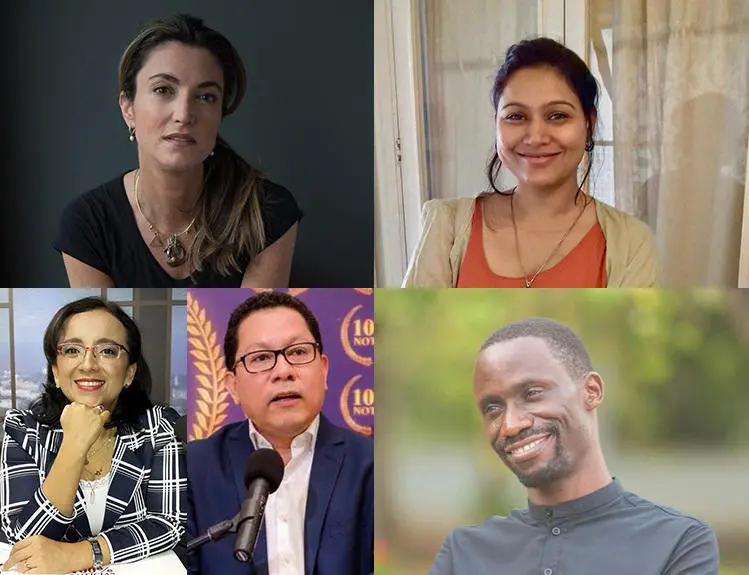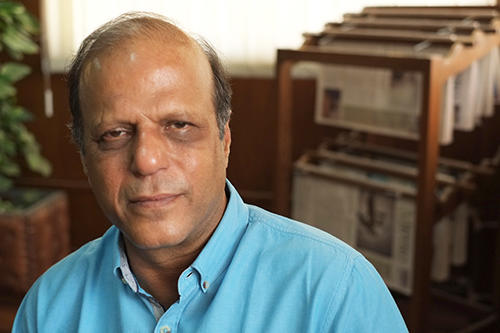CPJ is honored to present its 2019 International Press Freedom Award to Indian journalist Neha Dixit.
Neha Dixit, an award-winning freelance reporter, has covered politics, gender, and social justice in print, TV, and online media for more than a decade. She began her career at Tehelka magazine and then joined the special investigation team at India Today newsmagazine.
In 2019, Dixit spent months investigating and reporting stories that shed a light on important issues in the country, including extrajudicial killings by police. She also reported on the illegal detention of citizens under draconian laws that appeared to be motivated by political interests. In January 2019, the Office of the United Nations High Commissioner for Human Rights sent a notice to the Indian government to express its concern about the detentions.
In 2018, Dixit reported on the damage to the health of poor Indians who were being used as guinea pigs by pharmaceutical companies in illegal drug trials.
In 2016, she wrote a story for Outlook magazine that accused members of a right-wing nationalist group of trafficking more than 31 girls in Assam state to other parts of India in order to inculcate them with a nationalist ideology. After the story was published, members of the ruling party filed a criminal defamation suit against Dixit and Outlook, accusing both of violating Indian law. CPJ condemned the case, which continues today, and provided Dixit with support for its legal fees. CPJ’s research has found that section 153A of India’s colonial-era penal code, under which the suit was filed, has been used to silence journalists, writers, and academics in India. Dixit was also charged with “inciting communal hatred through writing,” for which she could face a five-year prison term.
After Dixit’s exposé on extrajudicial killings by the police, she said high-ranking police officials threatened her family’s safety if she continued to report on the issue. She is frequently harassed online as a result of her reporting, especially from alleged right-wing extremists. She has been threatened with physical attacks, rape, and death, and her personal information has been exposed online. She told CPJ in May 2019 that she faces up to 300 abusive messages a day.
Dixit’s work has been published in international outlets including The New York Times, Al-Jazeera, Caravan, and The Wire. She has received numerous awards, including the European Commission’s Lorenzo Natali Media Prize in 2011, the Kurt Schork Award in International Journalism in 2014, and the 2016 Chameli Devi Jain Award for Outstanding Woman Journalist.
The text of Neha Dixit’s acceptance speech, as prepared for delivery, is below
Thank you all!
When I wanted to go to college in Delhi to study journalism, most of my family was up in arms. No girl from my family had gone to another city to study. And journalism was not seen as a ‘decent job’ for ‘good girls.’ That barrier was passed. I became a bonafide ‘spoilt girl’ and there is no looking back. Then there were years with sexism in the workplace, censorship, and where editors who called me a ‘little girl’ and told me not to do ‘bleeding heart back of the beyond stories.’ I learnt a way to surpass that too.
The last couple of years have been about endless follow-up on legal cases, death threats, and rape threats — complete with descriptions of how it should be conducted on my body. They have also been about being held physically hostage by right-wing fundamentalists while reporting. Each time I exposed a case of extrajudicial killings by Indian police, I got repeated phone calls from top cops informing me that if I continue they know where my family members live. I learnt to turn a deaf ear to that too. There is no other way.
But despite all this, the question is why do we still continue as journalists? My small mind tells me we are diseased, addicted. And it is fueled by not just our own fixation on speaking truth to power but driven by the energies of our colleagues globally. You realize that each of your battles, personal and professional, is not unique. We are all in it together.
This is the first time in Indian history the prime minister, in this case Narendra Modi, has not addressed a single press conference in five years. In fact, a central government minister has coined and normalized the word ‘presstitutes’ for journalists who do their jobs.
With the rising number of killings, arrests, and attacks on Indian journalists on an everyday basis, the government has created an air of censorship.
I am deeply honored and humbled to receive this award. But this is not about me alone. My strength is not mine alone. It comes from the hard work and dedication of several of my colleagues who repeatedly keep setting examples of exemplary shoe leather journalism in these hard times. Let me make a small mention that most of them are women journalists. I also wish to thank my partner, Nakul, for being by my side always.
I dedicate this award to all Indian journalists who keep doing their jobs without resources and support with complete devotion and honesty.

